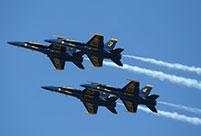 Yanxi Lake: Venue for APEC China 2014
Yanxi Lake: Venue for APEC China 2014
 Top 10 pricey destinations for studying abroad
Top 10 pricey destinations for studying abroad
 Couple chase tornados to create perfect storm photos
Couple chase tornados to create perfect storm photos
 Goddesses at Golden Eagle Festival
Goddesses at Golden Eagle Festival
 J-10 fighters show aerobatic stunts in smog-free sky
J-10 fighters show aerobatic stunts in smog-free sky
 Top 10 charming female soldiers of the PLA
Top 10 charming female soldiers of the PLA
 Charming contestants of Shanghai Int’l Model Contest
Charming contestants of Shanghai Int’l Model Contest
 Most amazing chi-pao beauties
Most amazing chi-pao beauties
 Beauties forever
Beauties forever
 Picturesque autumn scenery of Hongshan Army Horse Ranch
Picturesque autumn scenery of Hongshan Army Horse Ranch
CANBERRA, Oct. 17 -- Australian fighter jets have carried out at least two deadly air strikes against Islamic State (IS) militants, out of a total of 43 sorties by RAAF Super Hornet jets, military chiefs said on Friday.
It is unknown how many Islamic State fighters died in the attacks, although defense force officials said there had been " multiple" casualties.
The Australian Defense Force's Chief of Joint Operations Vice Admiral David Johnston told reporters at a briefing in Canberra on Friday that Australian forces had been forced to fly more missions over Iraq while U.S. planes had been diverted to the northern Syrian town of Kobane.
He revealed that in the past week RAAF Super Hornets carried out the second air strike and confirmed for the first time that the Australian strikes had killed IS fighters.
Australian planes had also been involved in strikes on an oil refinery, in a bid to destroy IS revenue sources, Johnston said.
The Super Hornets have so far clocked up 276 flying hours, he said, and average flight times have been eight to 10 hours. The E7 Wedgetail refueller has flown 11 missions.
Johnston said the impact of the Australian strikes was direct, as well as creating a morale boost for Kurdish fighters which would challenge the view that IS was invincible.
"What airstrikes offer apart from a direct action on top of IS facilities and degrading their capabilities, they have a much broader impact in terms of morale, the confidence and the notion of invincibility that ISIL fighters may have," Johnston said.
Johnston said he would not provide more detailed information on the number of casualties due to potential exploitation by the " aggressive propaganda campaign" of IS.
"The more we provide as to locations and dates, they can exploit that information back against us," he said.
Johnston was speaking after reports emerged from Iraq that Islamic State fighters were gathering tanks, armored vehicles and heavy artillery around a strategic town just west of Baghdad.
He played down suggestions of any grave threat to the Iraqi capital, saying that Iraqi security forces were pushing back to the west in response to IS troop movements.
Johnston said the situation around Baghdad was fluid, notwithstanding reports of IS advances and 150 deaths since Sunday. Commercial aircraft are still flying into Baghdad airport, he said.
Johnston said U.S. air strikes in Kobani were intensifying.
"ISIL are clearly very determined around this objective but they are suffering the loss of hundreds of lives in seeking to achieve it," he said.
Meanwhile, the Department of Foreign Affairs and Trade has repeated their call to any Australians still in Iraq to leave immediately.
The department said people should get out of the country while Baghdad International Airport was open and commercial flights were still operating.
According to the department's advice, the security situation is continuing to deteriorate and armed opposition groups are now active in many parts of Iraq.
 Shocking! Photos of Chinese fighters revealed
Shocking! Photos of Chinese fighters revealed Blue Angels thrill spectators in San Francisco
Blue Angels thrill spectators in San Francisco World's most intimidating nuclear weapons
World's most intimidating nuclear weapons Standard faces for each countries
Standard faces for each countries Who is China's campus beauty queen?
Who is China's campus beauty queen? Netizens fall in love with champion swimmer Ning Zetao
Netizens fall in love with champion swimmer Ning Zetao Vibrant 21-year-old and her own Cheongsam brand
Vibrant 21-year-old and her own Cheongsam brand Fashion style: Faye Wong vs Cecilia Cheung
Fashion style: Faye Wong vs Cecilia Cheung Leading director Wang Quan'an detained for 'buying sex'
Leading director Wang Quan'an detained for 'buying sex' Top 10 handsome football players
Top 10 handsome football players  Top 10 Chinese goddesses
Top 10 Chinese goddesses  Top 20 hottest women in the world in 2014
Top 20 hottest women in the world in 2014 Top 10 fifth generation jet fighters in the world
Top 10 fifth generation jet fighters in the world Top 10 pure beauties in showbiz
Top 10 pure beauties in showbiz  Top 10 world's highest-paid models 2014
Top 10 world's highest-paid models 2014 The most gorgeous Chinese women
The most gorgeous Chinese women Top 10 most handsome faces in Asia
Top 10 most handsome faces in AsiaDay|Week|Month